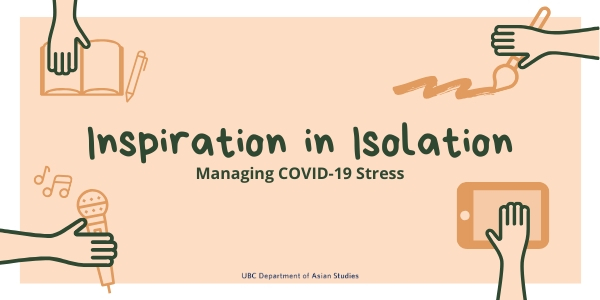

We’ve asked some of our Asian Studies faculty, staff and students to share their experiences on working from home. Sunnie Wang, our Chinese Language Program Coordinator and optimist extraordinaire, wins the prize of most thoroughly answering this questionnaire when it comes to discussing preparation:


What are some problems you may have encountered during the transition to remote working?
- I didn’t want to put on my makeup and just wanted to wear my pajamas all day long… I also needed to clean my apartment and find the best angle for my online classes. During each class, I seemed to say “Can you hear me?” more than 10 times and sometimes I was kicked out of my own class due to the internet problem. But it felt good that my students welcomed me with clapping emoji when I struggled back to the virtual classroom. The online classes are fun, actually! We created different ways to interact with one another.
How did you cope with the problems to ease the transition?
- Actually, it is challenging for all of us, including instructors and students to move classes online upon such a short notice. Ask the coordinator of the Chinese Language Program, what quickly came to my mind is–
- How can I help our instructors who mostly had no online teaching experiences learn to teach online classes in such a short time?
- What do we need to do to keep up the good quality of teaching and students’ engagement through effective teaching?
- How do we make the whole team work closely with one another to get through this? What can we do to ensure the wellbeing of students, TAs and instructors?
That is, how can we make sure everything, and everyone is interconnected and not falling apart?
So first, we set up the tone and structure of how we are going to collaborate during this unprecedented situation. The wellbeing of our three key players: instructors, TAs and students, is the top priority for us. We tried to make online teaching and learning as easy and simple as possible for both instructors and students. Meanwhile, we asked all TAs how their personal and academic lives were impacted and if they can still work, offering us help in assisting our students.
To lower everyone’s anxiety and increase our confidence and competency for successful online teaching and learning experience, we redeployed several key colleagues’ and TAs’ assignments to assemble a tech support term. Those key colleagues, including Anyi Lee and Lijung Lee, actively took the responsibilities of exploring all possibilities of pedagogical technology, finding out useful information and tips and sharing with other colleagues. Several colleagues, such as Pihua Lin and Yinghua Tsai, took care of level coordination work to ensure everything was on track. Other colleagues were also busy adjusting their courses. Meanwhile, several TAs worked with Arts ISIT to resolve students’ tech problems and even prevent tech problems from happening, such as arranging students’ practice of using Proctorio long before their final exams. The tech support did greatly release both instructors’ and students’ stress.
All instructors attended various workshops hosted by ISIT within UBC and even beyond. We even naturally formed a WeChat “learning group,” and our colleagues posted a lot of different workshop information and notes in the group for each other, every single day. I am truly proud of working with this strong team.
Besides getting to learn how to use tech in online teaching, all colleagues had the same goal of rethinking our curriculum, developing feasible online pedagogy and students’ learning outcomes by revising syllabus and reasonably adjusting students’ workload. Our principle is to keep things simple and clear, balance changes and unchanges, be consistent but flexible, and keep creating an interactive and communicative learning environment.
All of our colleagues worked together to look for the most useful resources for different formats of online courses. For the best learning effectiveness, we adopted synchronous teaching and some courses used blended learning by combining with synchronous and asynchronous ways of learning which brought in the implication of flipped online learning.
We also offered all instructors “caring for each other’s wellbeing” PowerPoint slides for students’ during our 20-minute online trial class in order to send the message to students that we are a supportive community and also let students get familiar with the use of online tools, such as Collaborate Ultra. This 20-minute online trial class is a great bridging for students to transit to online classes. We also encouraged instructors to integrate the situation, importance and impact of COVID-19 in their classes, but to some degree by which students can be reoriented and also keep their feet on the ground without being too overwhelmed by all external changes.
During our swimming in the tech ocean trying to survive, we also worked with TAs to design an online survey regarding students’ feedback on online language learning. We received over 300 responses across all 4 levels. We are still in the process of doing data analysis during the final exam period, but the data preliminary shows that most students think the transition to online Chinese language courses is smooth, and our instructors have prepared well for online teaching. The mean is 4.35. Also, the data indicates that students taking higher-level language courses have more positive attitudes toward online courses or hybrid courses, and students at the lower-level language courses prefer in-the-classroom learning. This data is still in the process of analysis, but we believe our students’ feedback is very meaningful for us to reconsider the course design and offering in the future.
A crisis can be an opportunity. This truly is a great experience of collaborative learning for us, and an invaluable opportunity for us to grow a lot professionally. We do see this crisis helped us build up a tight online community by taking proactive actions and made our instructor and TA team even stronger. Our original goal was just to survive until the end of the semester, but we turn out to thrive throughout this challenge.
Four Cs for our smooth transition: Change, connection, collaboration, and consistency .
What were some things you needed to get used to when working at home?
- I needed to remember to turn off my camera before classes were over.
Describe one new thing (skill, interest, pastime, etc) you may have learned during the quarantine time?
- I started to pick up my old hobby– water coloring! I almost forgot how great it is to mix colors and create new colors in every single stroke. Just feel the joy.
Any medium (music, books, cooking recipe, etc.) you could recommend that you’ve found relaxing/entertaining recently?
- I do some work out in my living room. I also found a lot of creative Youtubers teaching us how we can build up our 6-pack abs just in TWO weeks! Also, I followed Cuomo’s daily online briefing even though I am not living in New York State. I felt empowered with hope. I also watched a mom’s Montessori parenting channel on Youtube which is very therapeutic for me even though I don’t have kids.
During this time, have you sought/found any words of wisdom or quotes from your particular language area/culture/background that you have found to be particularly comforting?
- Oh. I always think powerful quotes are extremely helpful to me. Here is a paragraph that I saw on the Internet and shared it with my students — 坐在同一列车上,有人感染,有人安全,这是机体免疫力; 同样隔离,有人一年不愁吃喝,有人一星期就拮据,这是财务免疫力; 同样待在家里,有人读书,有人学习,空中课堂等很自律,有人睡觉,看电视,玩游戏,混混沌沌过一天,这是价值免疫力;一样的灾难,有人阳光向上勇往直前,有人怨天尤人,甚至仇视社会,这是心里免疫力;这是天灾,是一个大浪淘沙的过程,对所有人的体质,认知,良知,勇气,思想,灵魂,价值观等,都是一场赤裸裸的筛选。所以,在这次战役过后,你会更强壮,成为一个更有韧性的人?还是在过程中就慢慢失去免疫力,感觉自己很糟糕?”Sitting on the same train, there are people infected, and there are safe people. This is body immunity. During self-isolation, people will worry about eating and drinking for a year. Some people will struggle week by week. This is financial immunity. Staying at home, some people are reading; some people are studying, learning with great self-discipline how to take online classes. Some people will sleep, watch TV, play games, and live chaotically day by day. This is value immunity. In this disaster, some people bravely go forward, some people blame the sky, and some even hate society. This is the immunity of the heart. This is a natural disaster — a big wave. It will test all people’s constitution, cognition, conscience, courage, thought, soul, values, etc. So, after this battle, will you be stronger and more resilient? Or do you slowly lose your immunities in the process, and feel bad about yourself?”(Many thanks to our TA, Aydin Quach, for his translation)
To read more Inspiration in Isolation stories, click here!


